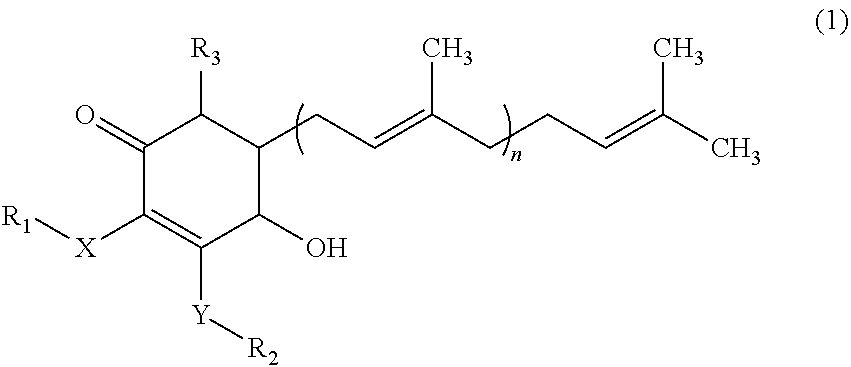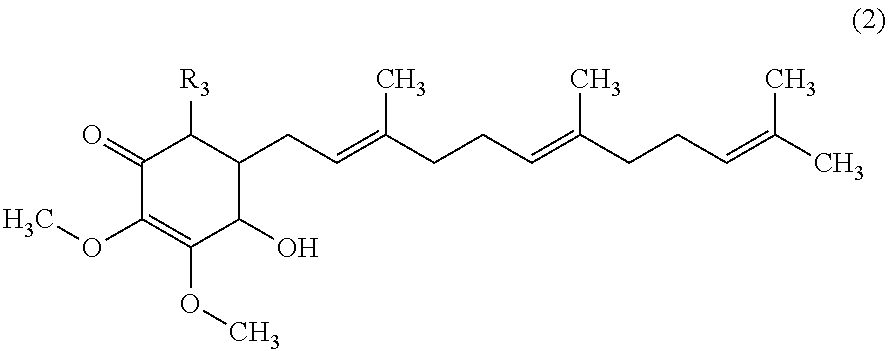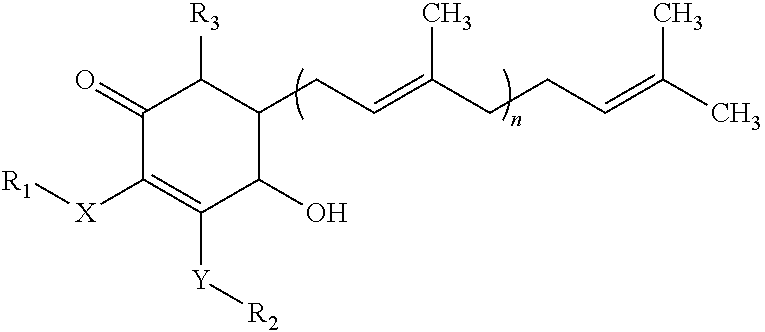Inhibition of the Survival of Bladder Cancer by Cyclohexenone Compounds from Antrodia Camphorata
a technology of cyclohexenone and bladder cancer, which is applied in the field of inhibiting the survival of bladder cancer cells by compounds, can solve the problems of poor prognosis, restricted therapeutic effects, and pain in the hands of paint workers, and achieve the effects of inhibiting the survival of bladder cancer cells, and prolonging the treatment tim
- Summary
- Abstract
- Description
- Claims
- Application Information
AI Technical Summary
Benefits of technology
Problems solved by technology
Method used
Image
Examples
example 1
Isolation of 4-hydroxy-2,3-dimethoxy-6-methyl-5-(3,7,11-trimethyl-dodeca-2,6,10-trienyl)-cyclohex-2-enone
[0019]One hundred grams of mycelia, fruiting bodies or mixture of both from Antrodia camphorata were placed into a flask. A proper amount of water and alcohol (70-100% ethanol solution) was added into the flask and were stirred at 20-25° C. for at least 1 hour. The solution was filtered through both a filter paper and a 0.45 μm membrane, and then collected as the extract.
[0020]The extract of Antrodia camphorata was subjected to High Performance Liquid chromatography (HPLC) analysis. The separation was performed on a RP18 column using a mobile phase consisted of methanol (A) and 0.1-0.5% acetic acid (B), with the gradient conditions: the ratio of (B) from 95% to 20% 0-10 minutes, from 20% to 10% 10-20 minutes, kept 10% 20-35 minutes, and increased from 10% to 95% 35-40 minutes at the flow rate of 1 ml / min. The column effluent was monitored with a UV-visible detector.
[0021]The frac...
example 2
In Vitro Survival Assay for Anti-Bladder Cancer Effects
[0022]Inhibiting effects of bladder cancer cells by cyclohexenone compounds of Antrodia camphorata from example 1 were assessed according to the anticancer-drug screening model of National Cancer Institute (NCI). The compound 4-hydroxy-2,3-dimethoxy-6-methyl-5-(3,7,11-trimethyl-dodeca-2,6,10-trienyl)-cyclohex-2-enone from example 1 was added into the culture media of bladder cancer cell line TSGH-8301 to determine the survival rates. Survival of cell was analyzed using MTT assay. TSGH-8301 cell line was a human bladder carcinoma cell line.
[0023]MTT assay is commonly used to analyze cell proliferation, survival rate of viable cells and cytotoxicity. MTT (3[4,5-dimethylthiazol-2-yl]-2,5-diphenyltetrazolium bromide) is a yellow dye which can be converted to water-insoluble purple formazan on the reductive cleavage of its tetrazolium ring by the succinate tetrazolium reductase in mitochondria of cells. The amount of formazan produce...
PUM
 Login to View More
Login to View More Abstract
Description
Claims
Application Information
 Login to View More
Login to View More - R&D
- Intellectual Property
- Life Sciences
- Materials
- Tech Scout
- Unparalleled Data Quality
- Higher Quality Content
- 60% Fewer Hallucinations
Browse by: Latest US Patents, China's latest patents, Technical Efficacy Thesaurus, Application Domain, Technology Topic, Popular Technical Reports.
© 2025 PatSnap. All rights reserved.Legal|Privacy policy|Modern Slavery Act Transparency Statement|Sitemap|About US| Contact US: help@patsnap.com



